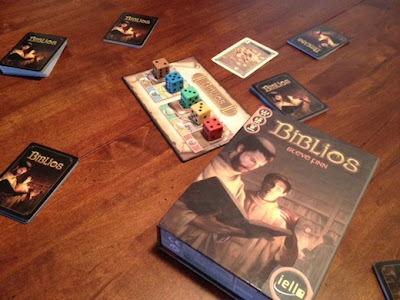When asking for games with depth that can be played in 30-45 minutes, someone recommended that I check out Biblios. So.... I did.
In Biblios, the goal is to get the most victory points by having the highest score in (enough of) the five different categories. To start the game, each category is worth three points. On a player's turn, he will draw a number of cards equal to the number of players plus one. After looking at each card, he must decide if he will keep it (one per turn), put it in the auction pile (one per turn), or put it face up in the middle (all the others). After he has gone through all of his cards, the other players get to take the cards that he placed in the middle - thus each player gains a card every turn. Any time one of the players gets a "church" card, they immediately adjust the value on one or two of the dice (and thus a category's value). After the deck has been exhausted, the auction phase begins. One at a time, all of the cards that were placed in the auction pile are auctioned off to players - who use cards to buy gold cards, and use gold cards to buy everything else. After the last auction, players compare scores in each category and the highest total in each gets the scoring die. Whoever has the most points from scoring dice is the winner!
Very ironically, I received my copy of Biblios at approximately the same time as I received a copy of Pax - and both games seem to have a similar core mechanic of "draw X cards, one at a time, and put them in different places." I listed this as a pro in Pax, and it is also a pro for Biblios - this mechanic forces the players to make meaningful, simple, and yet difficult decisions. If you make a mistake in the first round and accidentally give your opponents a powerful card, you're not going to instantly lose - but if you regularly give your opponents better cards than you keep, then you don't really stand a good chance of winning. And, with more players, these choices get tougher. You get to look at more cards with more players, and so you will have a much harder time deciding what to do with a mid-value card that you draw early. Should you take the safe bet and keep it? What if something better is drawn? But, you also don't want your opponent to have it!
 |
| Scoring dice - what each category is worth |
The third aspect of Biblios that I like is that not all of the cards are in the deck in each game (the number of random cards pulled out is different based on number of players). Because of the rule that you have to have the most points in a category to score, you are often trying to get the majority in that area (at least I was). The inner cover tells you the card breakdown, and so you can know when you have the majority. But! Not all of the cards are in the deck - and so you might have a majority without knowing it. And, a player that is better at figuring out when they have "enough" cards, without wasting extra card draws and money on getting a guaranteed majority will probably win over a player that always guarantees their majority.
 |
| Church cards adjust scoring dice |
The final pro that I will mention is that I like the church cards. Now, with that said, I don't like being the one to get stuck with the church cards - I would rather increase my score in one of the categories. However, the church cards are a good way to mitigate the fact that you know an opponent is going to beat you in certain categories. They are also useful for improving the value of your majorities. But, there is a touch of a bluffing element here, because if you are always increasing the value of the same category, your opponents will realize that you have a lot of points there, and they will focus on lowering it. But, at least in the auction phase, you can prevent them from doing so, by buying all of the church cards - but that will get expensive really, really quickly.
I don't really have any "cons" for Biblios. I found the game to be very fun, and I could play it repeatedly. I think that it is a great filler game or lunch game, but I don't know that I would go to a gaming session explicitly to play Biblios (though I'd consider it), which is the only thing that keeps it's score out of the upper echelon. And, with that said....
Overall, I give Biblios an 8.5/10. I think that it is a brilliant, light game, that can be enjoyed by gamers and non-gamers alike. If you have the opportunity to play it - do so!
If you are looking for games that can be played over lunch, you might also check out 1955: The War of Espionage, China, and Ra.

Played this for the first time with my wife last night & I have to say it was a blast. The game is short at about 30 minutes, but as Josh alludes to; each decision you make is tense & meaningful in both the draw & auction phases.
ReplyDeleteThanks for your wonderful website Josh; I frequent it all the time as our tastes appear to be somewhat similar.
-Josh R.